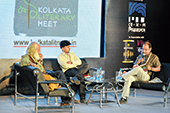 |
| Arvind Krishna Mehrotra (left) and moderator Sandip Roy listen in as Palash Krishna Mehrotra (right) reads from his book The Butterfly Generation on Sunday. (Anindya Shankar Ray) |
One is a noted poet, anthologist, literary critic and translator, the other an editor-author who has written a novel that paints a “portrait of young urban Indians”.
When father-son duo Arvind and Palash Krishna Mehrotra (of The Butterfly Generation fame) shared the stage at the Calcutta Literary Meet on Sunday, held in association with The Telegraph, it was to discuss “the writing gene” in a session titled ‘Raising the Butterfly Generation’. Journalist Sandip Roy was in the moderator’s chair.
Father and son delved into the question whether it was the “writing gene” that compelled the latter to become an author. And, if that were the case, how come Palash wrote books like The Butterfly Generation and Eunuch Park — worlds apart from poetry volumes like The Transfiguring Places, which his father is known for?
Palash confessed that growing up in Allahabad, having a private library and a family of writers contributed heavily to his being what he is today.
The freewheeling talk also probed the definition of an “Indian writer”, the pressure of writing an “India” book and English as a written language in the 1960s to the “Rushdie chutnification” of the 1990s, among other things.
“Nothing was taboo in the Sixties. You could say the most outrageous and blasphemous things,” said Mehrotra senior. “I wrote about the Ramayan in such words, and even published them as pamphlets, all at the age of 18.”
For Palash, it is painting the modern urban youth (The Butterfly Generation, if you will), their concerns and way of life, that takes centrestage.
He had the audience in splits when he read out from The Butterfly Generation. “My father’s name is Inu, and he teaches at the inuversity,” he read out the observation of a nursery toddler, the character based on himself.
“At Jaipur, it was something of a tourist spot, where the upper middle-class audience had come to see the tamasha,” Outlook editor Vinod Mehta, who was in the audience, told Metro. “Here, the people might be more humbly dressed, but the meet centres around books wholly.”
Author Anita Nair said: “It’s very focussed here. There is just one session at one time, so you don’t have to rush about to choose.”










